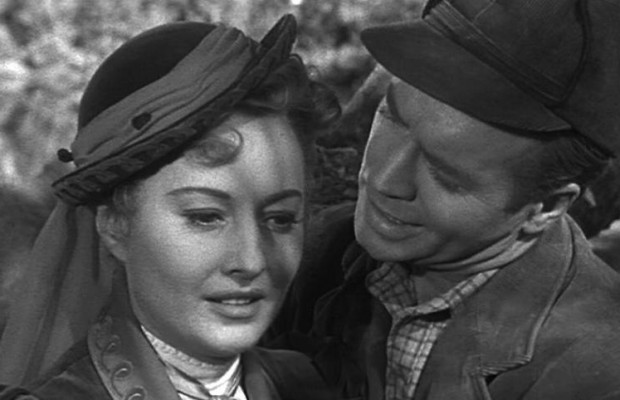All I Desire (1953)
By Toronto Film Society on October 20, 2014
Toronto Film Society presented All I Desire (1953) on Monday, January 20, 1975 in a double bill with Kiss Tomorrow Goodbye as part of the Season 27 Monday Evening Film Buff Series, Programme 3.
Production Company: Universal International. Director: Douglas Sirk. Producer: Ross Hunter. Script: James Gunn, Robert, Blees. From the novel “Stopover” by Carol Brink, adapted by Gina Kaus. Photography: Carl Guthrie. Editor: Milton Carruth. Art Directors: Bernard Herzbrun, Alexander Golitzen. Set Designers: Russell A. Gausman, Julia Heron. Musical Director: Joseph Gershenson. Costumes: osemary Odell. Production Manager: A. Mack d’Agostino. Assistant Directors: Joseph E. Kenny, Ronnie Rondell. Dialogue Director: Jack Daniels. Choreography: Kenny Williams. Lyric “All I Desire”: David Lieber.
Cast: Barbara Stanwyck (Naomi Murdoch), Richard Carlson (Henry Murdoch), Lyle Bettger (Ductch Heineman), Marcia Henderson (Joyce Murdoch), Maureen O’Sullivan (Sara Harper), Richard Long (Russ Underwood), Fred Nurney (Peterson), Billy Gray (Ted Murdoch), Lotte Stein (Lena Engstrom), Lori Nelson (Lily Murdoch), Dayton Lummis (Colonel Underwood), Lela Bliss (Belle Staley), Ed Cobb (Driver), Henry Hoople (Dutch Heieman’s Customer), Guy Williams, Charles Hand.
Douglas Sirk (b. 1900) made ten films in Europe and thirty films in Hollywood between 1935 and 1959. Although his films pleased an enormous audience at the time of their release, it is only since his retirement that Sirk’s achievements have received serious critical appraisal. It should be remembered that, in his early Hollywood films, Sirk had little freedom to use his own ideas, with the notable exceptions of Summer Storm (1944), A Scandal In Paris (1946) and Lured (1947)–three films which predicted his extraordinary talents. Only after the commercial success of Magnificent Obsession in 1954 did he acquire the freedom he needed to create his masterpieces Written on the Wind (1957) and The Tarnished Angels (1958). His last film Imitation of Life (1959) was Universal’s bggest box-office success. Perhaps Sirk’s knowledge of classic plays, gained through his career as a theatre director in Germany, empowered him to elevate the genre of the American melodrama to the level of Greek tragedy.
When I first saw Sirk’s films in the fifties, I dismissed them as made-for-the-masses pap. But upon re-seeing them recently, I find them far more interesting than many acclaimed ‘art’ films. I especially like Sirk’s smug, self-righteous American world-view; the way his films abound with cliché images; his larger-than-life characters often shown trapped in a setting of turmoil and decay; and the way he presents all this with the most extravagant use of emotional and visual style.
All I Desire is one of a series of films that Sirk made about small-town American life at the turn of the century (among them Take Me To Town [1953]). On On the surface, it is a standard ‘woman’s weepie’ story full of heavy social drama and personal conflicts. Barbara Stanwyck portrays Naomi, a woman who, having left her husband and children ten years previously for an unsuccessful career as an actress, returns home hopeful of fulfilling her dreams of reconciliation, and instead finds pretense and disillusionment. Beneath the surface, it is an attack on the moralism of middle-class America. The film’s original title was ‘Stopover’, a title that Sirk felt deepened the irony of the film. In the original ending (which was changed against Sirk’s wishes) Naomi leaves–her homecoming has only been a stopover.
Barbara Stanwyck was born in Brooklyn in 1907. Ladies of Leisure for Frank Capra was her first real success. Her screen roles project a self-assured, independent woman, often susceptible to love, but not above using her wiles to manipulate men. One of Hollywood’s better actresses, she has been nominated for an Academy Award in Stella Dallas, Ball of Fire, Double Indemnity and Sorry, Wrong Number, but has never won an Oscar.
Notes by Aideen Whitten
You may also like...
-
News

Frances Blau
Toronto Film Society | February 27, 2024On Monday, February 26th, 2024, Toronto Film Society lost longtime friend, supporter, and board member Frances Blau. Known for her sense of humour, her love of film, her generosity,...
-
Special Events

Monday Evening Film Noir Double Bill at the Paradise Theatre
Toronto Film Society | July 8, 2024The Toronto Film Society presents a film-noir double feature at one low price! The Window (1949) in a double bill with Black Angel (1946) at the Paradise Theatre on Monday, August...
Programming

Virtual Saturday Night at the Movies
Toronto Film Society | July 20, 2024Toronto Film Society is back in the theatre! However, we’re still pleased to continue to bring you films straight to your home! Beginning Season 73 until now we have...
4-
 Toronto Film Society | July 8, 2024
Toronto Film Society | July 8, 2024
Monday Evening Film Noir Double Bill at the Paradise Theatre
-
 Toronto Film Society | November 6, 2022
Toronto Film Society | November 6, 2022
-
 Toronto Film Society | August 1, 2023
Toronto Film Society | August 1, 2023
Donate to Toronto Film Society – We’re now a Registered Charity!
-
Copyright © 2017 Toronto Film Society.








Leave a Reply